
News release: 25 Mar, Karachi | |
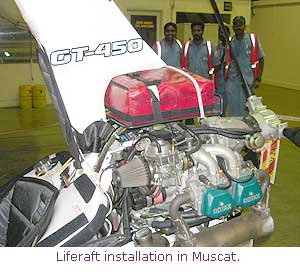 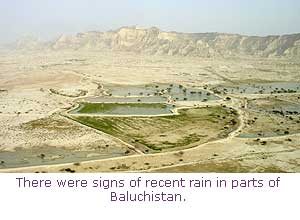 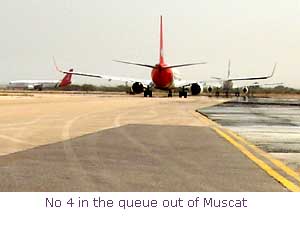 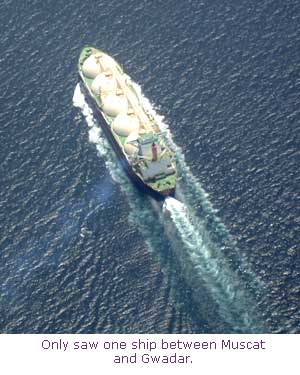 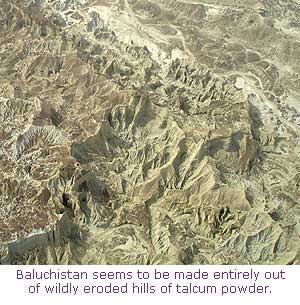 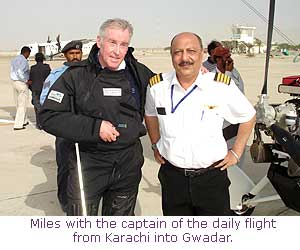 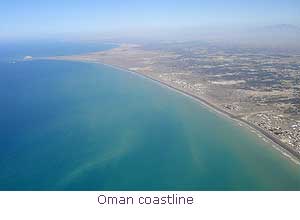 | The Omanis were absolutely charming, but do like their procedures. Each day I had to go to the machine to do a bit of maintenance and tweak things which weren't properly prepared before the start by you-know-who; notably the fuel system, video and life raft. I had no special pass into Seeb international so I had to go in and out of the airport the same way as ordinary passengers. Getting in wasn't too difficult and only took about half an hour. Once in, the engineers couldn't have been more helpful except they had no influence in the business of my escape from the airport once I was done for the day, so getting out, or rather getting back into Oman, was a different matter, and seemed to take longer every day. At first I had a paper to say I was crew but the chaps in immigration took that away from me in exchange for my buying a visa on day two. Thereafter it always took a lot of explaining that I hadn't actually been anywhere except in the maintenance hangar. Having at last got the life raft out of the customs at midnight Thursday, Jon Cooke arrived Friday morning with it's bracketry from P&M to mount it conveniently and accessibly above the engine, or rather, without its bracketry because the airline had left it in his luggage in Dubai. They promised it would arrive that night so I went into the airport to get the machine fuelled up and otherwise ready to go. Unusually I had the option of super unleaded from a pump on the airfield or avgas. The choice wasn't difficult when I found out that the super was about four times the price of their Avgas. The remaining life raft stuff did turn up as promised but I wasn't satisfied with the installation until about 10pm. Getting back into Oman this last time seemed to take an extra long time as they weren't the same chaps on duty whom I normally dealt with, and I didn't escape until midnight. One last time I also had to pay the extortionate fixed taxi rate back to our hotel which was about $20 each way for a 2km trip. The engineers were astounded at this price as the normal rate for such a distance was less than a dollar but it was a stitch-up for tourists and seemed completely non-negotiable, but I was usually carrying too much stuff (or perhaps I'm too idle) to walk. In retrospect it probably would have been cheaper to have hired a car even if it had only 20 Km on the clock after three days. Saturday morning we were at the airport before eight but it seemed to take even longer than usual just to get into the airport and then took ages to finish the paperwork. Finally up and running, we had to queue behind a load of heavy jets for takeoff, so we weren't off until well after ten. In retrospect this was a bit of a mistake and we should have been there earlier as we planned to go to Karachi in one day with a stop in Gwadar to refuel. Right turn off the runway, over the herd of Nimrods in the military area and straight out to sea. Having changed the plugs and fiddled with the fuel system I was particularly sensitive to any strange sounds, but all seemed well. One of my improvements in Muscat had been to sort out the compass and attitude sensors for Miles' computer so they are now fixed to the machine rather than floating around in a bag in the pod pointing in a random direction so once we levelled off at 4500 ft Miles took control and pretty much flew the entire 212 Nm across to Pakistan. Visibility was pretty terrible and I saw just one ship, one of those massive gas tankers, and a couple of smaller boats on the entire crossing. Our friendly tailwind was still with us, albeit only about 5 Kt, but better than nothing. Cyprus - Lebanon - Syria - Jordan was our first 'multi-country' flight, this was our second. Our route took us for 33 Nm through the very extreme corner of Iranian airspace. We had a clearance of course, but we'd seen the news that a bunch of marines had been 'kidnapped' up near Iraq so I suggested to Miles that he should be ready to turn sharp right back into Muscat or Pakistan airspace if anything threatening appeared. It didn't, in fact it was nice to talk to Tehran control after we lost Muscat about 60 miles out; they sounded very friendly. We made landfall at Jiwani. I wasn't sure what to expect of Baluchistan except I knew it is mostly a fierce enough desert to have swallowed a large part of Alexander the Great's army as they returned from India. From what I could see in the 30 min or so before we landed at Gwadar it is made of flat plains interspersed with dramatically eroded hills. The town itself is on a narrow isthmus leading out to a small mountain not quite surrounded by sea. The whole place is remarkably distinctive and as soon as I saw we were going there I knew I'd seen the same place from the window of an airliner at great height a few years ago. From our height I was more interested in the great earthworks going on about the place; they made no sense to me, it looked like they were building roads all over the desert, but on such a vast scale it must have been some sort of mining operation, but no sign of what they might be mining or where it was being processed. I've never seen anything quite like it. Baluchis are notable warriors so I didn't know quite what to expect when we landed, but a crowd including the local press were waiting for us as we taxied in and we were made more than welcome. Even better, they were waiting with fuel and paperwork so we could carry on to Karachi as soon as we liked. I left Miles with the press while I refuelled from some plastic cans with stuff which smelled a like avgas, but with a tinge of something like weed killer, though I couldn't imagine where weeds could grow in what appears to be a place made entirely of talcum powder. Even with the light wind the stuff was blowing about a bit, it must be simply ghastly in a blow. I was assured the fuel was 'a bit old' but 'works fine in my mower' which made me wonder whether I'd landed on a different planet as it really didn't seem the place for mowers. Most of the next leg down to Karachi was over land and there didn't seem to be much alternative, so I filled up. Then there was the matter of forms. In the absence of any carbon paper I had to fill out the same one six times, immigration stamped our passports, Miles finished his interviews, lots of photos were taken and then we were off. Our flight plan somehow got done without any intervention on my part and as we taxied out the air traffic controller regretted over the radio that he couldn't come over to meet us but he couldn't leave his post. I got permission to do a low fly-by his window as we departed; he seemed to appreciate it. What charming people! In our brief stop there I had asked about the earthworks I'd seen and the answer was almost unbelievable. The Pakistan government has decided to exploit Gwadar's strategic position just outside the Gulf and turn it into another Dubai. Everyone has seen what is possible with a bit of imagination and enterprise over in Dubai which has been turned from a sleepy fishing port into the hottest property this side of anywhere in nearly no time at all. The giant wide roads I'd seen weren't mining operations at all, but really were going to be roads! I was told that President Musharraf had been there only three days before to sign a 40 year contract with the Singapore Port Authority to build and operate a new deep water port 'even bigger than Karachi'. It would seem there's gas under Baluchistan which has not yet really been touched and this is a great place to export it from in the new generation of cryogenic liquid gas ships being built to supply Europe and the far East. There are also plans to build pipelines to the other oil and gas rich 'stans to the north which will avoid some of the more sensitive areas of the Middle East. The one thing missing seems to be water, but I suppose with enough fuel this can be produced by huge desalination plants like they do in the Gulf. So here's my real estate hot tip of the next few years: Gwadar. It will be very interesting to see what happens. We still had some four hours to fly to Karachi and there was the rather outstanding matter of daylight. If things got late I though we could divert to either Pasni or Ormara which were exactly on our route. After a while, Karachi Control, with whom we had good contact also began wondering about the same thing and I suggested Ormara. By the time a decision came back we were well past Pasni which was clearly a military airport. As their eventual proposal was for us to return to Gwadar I supposed that Ormara was military too and we wouldn't be made very welcome, however returning to Gwardar wasn't really an option by this time as our tail wind was strengthening considerably and it would have taken just as long to get back there as go on. The third option would have been to land on the road which looked pretty good and take our chances in the talcum powder with Baluchis. This wasn't a terribly exciting prospect compared to a nice comfy bed in a hotel so we elected to press on to Karachi even if we were going to be quite far out to sea for the last 65 miles. "You are happy to switch to IFR then?" they asked. Of course this was a bit of a leading question considering we're not really equipped for such a thing so I tried the idea of 'night VFR' on them but the concept obviously doesn't exist in Pakistan and just got a mystified 'what?' back. As for IFR, I wasn't sure there were likely to be any roads, rivers or railways where we were going, but assuming they knew something I didn't, I agreed I was up for it. They didn't question this decision any further, though of course having only a headlight there was a chance we could be in a bit of trouble when - if, we got there. At this time it was still nice bright sunlight so I began considering how I was actually going to be able to fly the thing for a couple of hours at night into a major international airport. Of course a trike isn't like a 3 axis aircraft and it's perfectly possible to fly one in cloud or at night with just an altimeter and a good compass, the big problem was how I was actually going to be able to see either of them in the dark, or the radio, or the transponder, or the fuel gauge. Miles said he had a torch in his saddle bag. This was interesting and we discussed it for some time, the problem was what he would throw into the propeller while he was trying to find it. We decided that on balance it should stay there along with everything else in his bag. Another alternative was for Miles to take command, his computer tells him both of these things in his headset, but it seems to get hot and sometimes just stops working so I wasn't very keen to have to rely on that alone, and in any case we do tend to weave rather a lot when Miles is in control and I wasn't very sure that I'd be able to keep on top of it in the dark. Of course my excellent Garmin 496 GPS has all sorts of moving map, compass, GPS altitude and angle of bank indicators which would probably do, but of course that could fail too. As the sun went down I thought I probably had the answer. Principally I would rely on my GPS and Miles' altimeter. We were at 6000 ft so if his thing failed we wouldn't immediately crash. In the back of my head I remembered the radio has a backlight to its display and with a bit of fiddling around I got it working. The sun went down and my GPS went into 'night mode' - something I didn't even know it did. Before it got completely dark I pumped all the remaining fuel over from the reserve tank so I knew we had around two and a half hours of fuel remaining without having to switch valves or pump any more. We went out to sea. What saved the day (night, really) was the lanc cable on the video recorder which has rather a bright red or green LED on it to show what mode it's in. This is on a flying lead velcro'ed onto the dash and it doubled as an excellent torch, I could see all the instruments with it apart from the compass and I could have rearranged the wiring a bit as we went along if I had needed to see that. Of course there was a risk the video batteries would run out if I had it on too much so I would use it sparingly. It got very dark. No moon, just a few stars. I found that by keeping a friendly star just in front of the leading edge we could keep a nice straight course without having to constantly refer to the GPS which even in night mode was rather too bright, but I wasn't inclined to fiddle around with it too much looking for the adjustment. Occasionally we flew over fishing boats carrying bright lights but most of the flight was pretty lonely in our own little cocoon. For some reason we also lost the previously very good comms we'd had with Karachi; they must have been on a repeater at those two military airfields. After some time the glow of Karachi appeared on the horizon and we were soon over the coast. I'd re-established comms of a sort with Karachi international but they were very difficult to understand; though I got enough to realize they wanted us fly over central Karachi at night at about 1000 ft... I had my LED on all the time now to see the altimeter and rather inadvertently got rather a fine video of it. Miles wondered whether I'd switched on the headlight yet, I didn't think we were quite low enough to hit any tall buildings so I thought I'd only do that on finals in case the bulb blew. There wasn't any other traffic about and as we got near I hoped my GPS was telling me exactly where the airport was because it wasn't until very late on that I could actually see it. In the end we did a very tidy approach down the flare path and the headlight worked rather better than I expected for the landing. Once we were parked up in the middle of a vast area of concrete quite a lot of people came over to have a look including some of the guys from ATC. No suggestion was made that perhaps we shouldn't have been flying into a major international airport at night without lights in such a craft, I apologized for my crappy radio (which I think was actually their problem as generally it has been fine), they just said they were glad we were safe. It looked like we were off the hook. Karachi international is huge but nobody capable of making decisions was about rather late on a Saturday night and I had a terrific struggle finding somewhere to park the machine anywhere but on that massive apron where it would have been blown away by the first passing Jumbo. There was a perfectly good place in an old baggage hall just opposite. Yes, we could put it there but it was more than anyone's job was worth to let the machine cross a yellow line to actually get to it. Eventually I got someone to take me round the corner to a massive array of PIA maintenance hangars which all had plenty of space in them but I went from office to office with very nice people but nobody who could possibly make a decision. Eventually I did find someone who started bandying about figures like $100 an hour, but after a lot more phone calls eventually found a place free of charge. Then there was immigration and customs to do (again, as technically we'd already done them both in Gwadar) so we didn't get to our hotel until some time after midnight. Miles was very tired, but it was a long and successful day. We did 509 Nm in seven and a half hours flying. Today we heard we will be having a big do in the VIP area of the airport for our departure tomorrow. We met the President of the Pakistan Aeronautical Society who was once president of PIA, chief of the Pakistan Air Force, and, extraordinarily, also of the Zimbabwe Air Force in the mid 1980's which is of course where Miles was born and raised. We've done TV interviews and people have been phoning to apologize for the 'misunderstanding' about hangarage yesterday evening. Things seem to be going pretty well. We're off to India tomorrow. |


